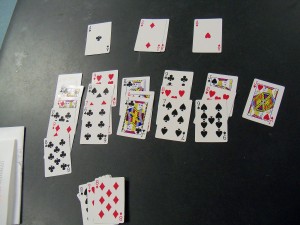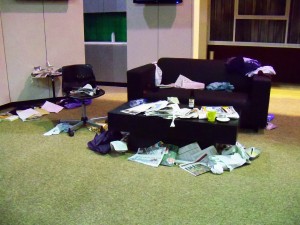I frequently get asked how stage management is different in the US and the UK. Here is an explanation of what the SM team does in the UK based on my own personal experiences. I know larger (i.e. better-funded, or West End) companies work differently, but this is the basic breakdown of SM duties for the majority of mid to small-scale theatre companies in the United Kingdom.
As a whole, the stage management team is responsible for sourcing the props and furniture for shows, taking blocking and notes in rehearsals, running rehearsals and backstage during techs and performances, ensuring lines of communication are open between everyone: directors, designers, technical departments, producers, performers, everyone, and occasionally making tea. There are generally at least three members on each team. The Stage Manager (SM), the Deputy Stage Manager (DSM) and one or more Assistant Stage Managers (ASM). Sometimes the stage manager will have a duel role as a company or technical manager as well, and will have a job title of Company Stage Manager (CSM) or Technical Stage Manager (TSM).
The DSM is exclusively responsible for the creation of the prompt book with all of the blocking and cues for each production. They are also primarily responsible for calling the shows. It is quite common for the prompt desk to be on the stage deck, just off of the proscenium. Traditionally this is called “prompt corner” and is usually located Stage Left. Hence the older, but still occaionally heard terms for Stage Left and Stage Right to be Prompt Side (PS) and Off Prompt (OP) respectively. A prompt desk located stage right is called “Bastard Prompt”. The DSM is the one in all of the rehearsals and making sure that any notes get passed on to the appropriate people or departments and making sure the rehearsals run as smoothly as possible. Depending on the company and SM team, the DSM will create in conjunction with the director/musical director the schedule for each day or rehearsal period.
The Stage Manager is responsible for making sure that everyone is communicating effectively. They will liaise with the director and designers and make sure that any notes coming out of rehearsals are followed up in the various technical departments and that everything is running smoothly. This position is most similar to the US stage manager’s administrative duties. The SM will also be ultimately responsible to overseeing all of the props and furniture for the shows. Depending on how much time their administrative duties take up, and how they work with the ASM, the SM may not spend all that much time actually working with props. During shows the SM is usually backstage making sure things are running properly and will quite often have duties that will include: cuing performers, checking everyone is in the right place at the right time, moving scenery, handing off props and putting out fires (metaphorically and occasionally literally).
In my personal experience as an Assistant Stage Manager, the majority of my time during rehearsals has been spent working on making sure we have everything on the prop list. This can include everything from hoofing it around town looking for furniture, making paper props, compulsively checking Ebay for that really hard to find item, modifying existing props to make them do that really specific thing the director has asked for, pulling props from storage, meeting with the designer, painting anything and everything, breaking down and aging new things, shopping for the basics, and pretty much anything else needed to get everything together. Not much of my time was ever spent in rehearsals: there were too many things to do/buy/paint/fix elsewhere.
During tech and performances, I was normally backstage, usually running one of the wings. Setting up and checking props and the set was an essential part of my routine for each show. As and ASM I was responsible for checking performers to make sure they had everything they needed and were where they needed to be when they needed to be there. I would hand off props, page doors and curtains, move sets and furniture, run technical cues (including flying), help with quickchanges and generally anything else to be helpful backstage. Stage management in the UK are expected to be an active part of the run crew, and do no have nearly as many restrictions as to what they are and are not allowed to do backstage as Equity stage management in the US.
The most important thing I had to do as an ASM was ensure there was enough milk for tea. Seriously, if there wasn’t milk, I was likely to have a riot on my hands. In my British career, I have probably spent more petty cash on milk than on everything else combined.



